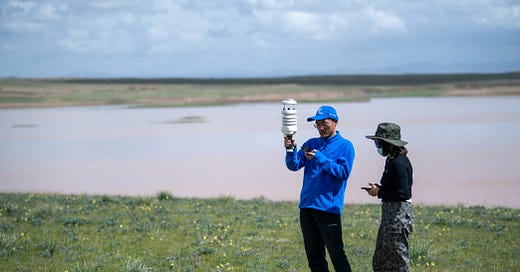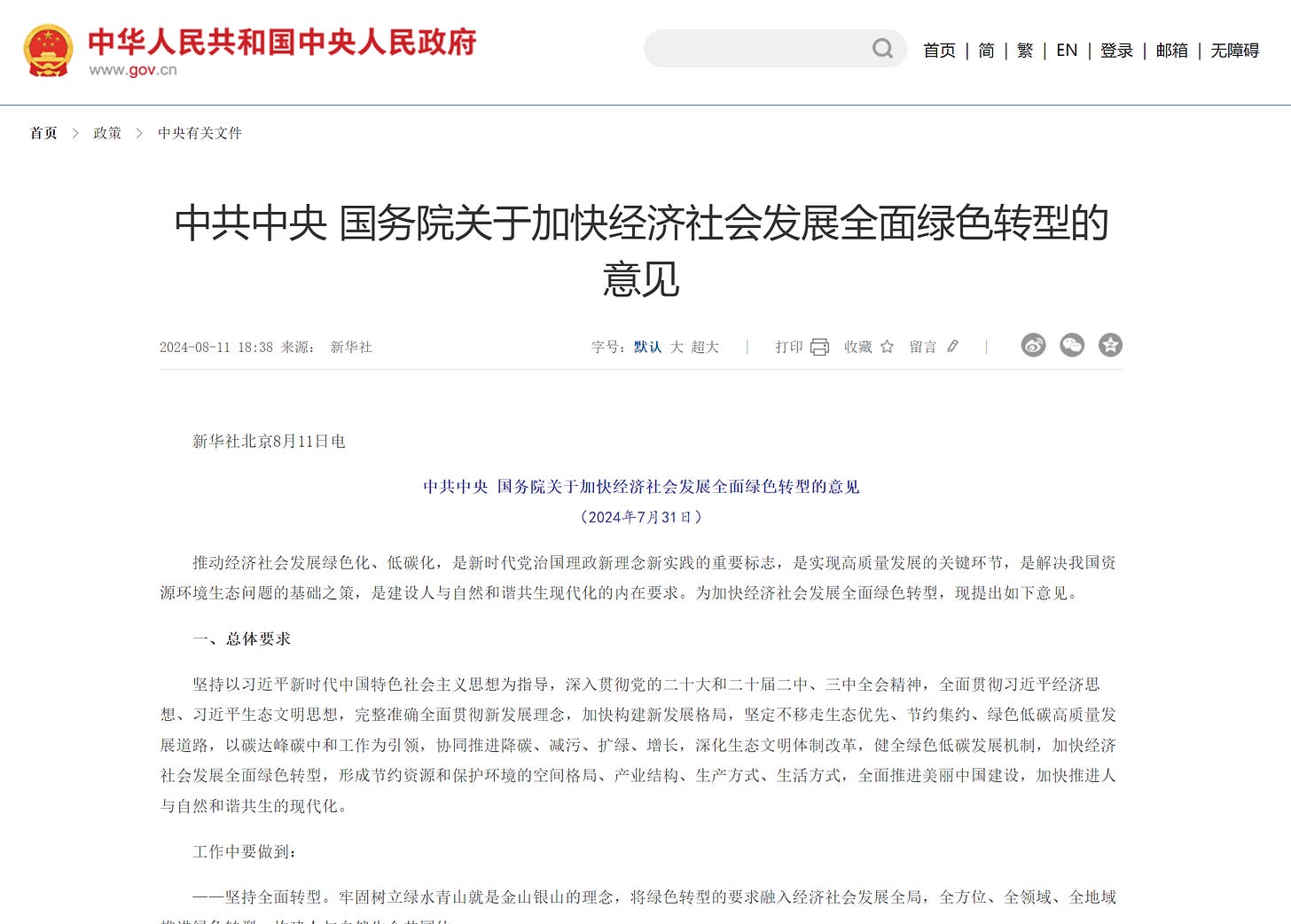China's third plenum resolution: Deepening reform in ecological conservation
China issues guidelines to ramp up green transition of economic, social development.
Good evening. Yesterday marks China’s second National Ecology Day. The resolution on comprehensive deepening of reforms for advancing Chinese modernization lists "加快经济社会发展全面绿色转型 accelerating the green transition in economic and social development" as one of the seven major objectives outlined in China’s five-year reform plans.
Section XII of the resolution, titled "深化生态文明体制改革 Deepening Reform in Ecological Conservation," is divided into three parts detailing China's reform plans in this area. These include improving the basic systems for ecological conservation, improving environmental governance systems, and improving the mechanisms for green and low-carbon development:
(47) Improving the basic systems for ecological conservation
We will implement region-specific environmental management systems featuring differentiated, targeted regulation and improve the systems for environmental monitoring and assessment. We will establish sound, united, well-aligned systems for regulating the use of territorial space of all types across the country and for approving territorial space plans. To improve the property rights and management systems for natural resource assets, we will refine the mechanism for the delegation of ownership over public-owned natural resource assets and establish systems for assessing and supervising performance in terms of protecting the environment, protecting and utilizing natural resources, and ensuring that natural resource assets hold their value and appreciate. We will improve the coordination mechanism for ensuring national ecological security. An environmental code will be compiled.
(48) Improving environmental governance systems
We will develop responsibility, oversight, and market systems as well as laws, regulations, and policies to improve environmental governance. We will refine the institutions and mechanisms for ensuring that pollution control practices are targeted, grounded in science, and law-based, and implement an oversight system for stationary pollution sources centered on emissions permits. We will establish systems for the coordinated treatment of new pollutants and management of environmental risks and make a coordinated push to reduce the discharge of various pollutants. The reform to advance the law-based disclosure of environmental information will continue, and an environmental credibility oversight system will be put into place. We will develop systems for integrated upstream-downstream environmental governance in major river basins. Comprehensive efforts will be made to develop the national park-based system of protected areas.
We will implement the management system for ecological conservation redlines, improve the mechanisms for integrated protection and systematic governance of mountain, water, forest, farmland, grassland, and desert ecosystems, and develop multiple funding mechanisms for ecosystem protection and restoration. We will enforce the system of mandatory limits on the use of water resources and replace the water resource fee with a tax nationwide. The coordination mechanism for biodiversity protection will be enhanced, and the systems for developing and protecting marine resources will be improved. We will refine the mechanisms for realizing the market value of ecosystem goods and services. We will further reform the system of paid use for natural resources. We will advance comprehensive compensation for ecological conservation, improve the trans-regional compensation mechanism for ecological conservation, and take coordinated steps to promote compensation for environmental damage.
(49) Improving the mechanisms for green and low-carbon development
We will implement fiscal, tax, financial, investment, and pricing policies as well as standards to support green and low-carbon development, develop green and low-carbon industries, improve incentive mechanisms for eco-friendly consumer spending, and work toward an economy that facilitates green, low-carbon, and circular development. We will optimize policies on green government procurement and refine the green taxation system. We will improve the systems for total resource consumption control and comprehensive resource conservation, as well as the system for recycling waste and used materials. Mechanisms for ensuring clean and efficient use of coal will be refined. We will accelerate the planning and development of a new type of energy system and improve the policies and measures for promoting the absorption of electricity generated from new energy sources into power grids and for the regulation of such energy. Improvements will be made to the working systems for adapting to climate change. New mechanisms will be put in place to facilitate the transition from controlling the total amount and intensity of energy consumption to controlling the total amount and intensity of carbon emissions. We will establish a carbon emissions statistics and accounting system, a carbon labeling and certification system, as well as a carbon footprint management system. We will also improve the cap-and-trade system for carbon emissions and the trading system for voluntary greenhouse gas emissions reduction. On this basis, we will actively and prudently move toward reaching peak carbon emissions and carbon neutrality.
In an official guidebook published last month to help people better understand the resolution, 孙金龙 Sun Jinlong, Secretary of the Leading Party Members Group of the Ministry of Ecology and Environment, outlined the significance of deepening reform in ecological conservation in the new era from four aspects in his article 深化生态文明体制改革 Deepening Reform in Ecological Conservation(Page 322-329).
(四)深化生态文明体制改革是以引领全球环境与气候治理构建地球生命共同体的迫切需要。习近平总书记强调:“面对生态环境挑战,人类是一荣俱荣、一损俱损的命运共同体”。当今世界百年未有之大变局加速演进,全球环境治理的复杂性、严峻性、不确定性上升,政治化趋势明显增强,我国参与全球环境与气候治理面临新任务新挑战。新时代新征程上,必须进一步深化生态文明体制改革,增强我国碳达峰碳中和工作、应对气候变化战略、生态环境战略、国际和外交战略协同性,坚决维扩我国发展利益,持续提升我国在全球环境与气候治理中的话语权和影响力,引领推动全球可持续发展,共建清洁美丽世界。
Fourth, deepening reform in ecological conservation answers the pressing needs for China to take a lead in improving global environmental and climate governance, and building a shared future for all life on Earth. "In the face of environmental challenges, all countries are in a community with destinies linked, and no country can stay immune," emphasized General Secretary Xi Jinping. Currently, the world is undergoing rapid and unprecedented change unseen in a century, featuring ever more complex, severe and politicized global environmental governance with rising uncertainty. China is confronted with emerging tasks and challenges as it participates in the global environmental and climate governance. In the new era, we need to further deepen its reform in ecological conservation and enhance the coordination of promoting the goal of peaking carbon emissions and reaching carbon neutrality, strategic response to climate change, ecological environment strategy and international and diplomatic strategy. We need to resolutely safeguard our development rights and interests, continue to strengthen China’s discourse power and influence in global environmental and climate governance, take the lead in promoting the global sustainable development, and collectively build a clean and beautiful world.
The last but not least aspect links "deepening reforms in the ecological conservation" with "taking a lead (引领)" in improving global environmental and climate governance." "Taking a lead (引领)" shows that China views assisting other countries in advancing global environmental and climate governance as its own responsibility at the top-level design. "Pressing needs 迫切需要" indicates that policymakers are aware that without reforming China's own system, China cannot achieve its goal of leading global climate initiatives.
Additionally, Sun highlighted the strategic importance of coordinating domestic ecological conservation reforms with China's global strategy. It's also important to note that Beijing places significant emphasis on its discourse power and influence in global environmental and climate governance. Looking ahead, we can anticipate continous discussions on climate change cooperation between major powers such as China, the United States, and EU. However, due to practical considerations, such cooperation is likely to be closely intertwined with the dynamics of major power competition.
It should be noted that the resolution typically serve as “纲领性文件” (framework document) for reform policies, with specific measures often reflected in detailed policies released subsequently. As Ying Xue, a Chinese think-tank researcher and the founder of the newsletter "China Ecological Civilization," explained in her tweet, this can be interpreted as “纲举目张 gāng jǔ mù zhāng” (Once a key link is grasped, everything falls into its place).
On Aug. 11, less than a month after the resolution was announced, the CPC Central Committee and the State Council unveiled a set of more detailed guidelines to ramp up green transition in all areas of economic and social development.
According to the guidelines, the main objectives include, by 2030, the scale of the energy conservation and environmental protection industry in the country will reach about 15 trillion yuan (about 2.1 trillion U.S. dollars), the proportion of non-fossil energy will increase to about 25 percent of energy consumption. The carbon emission intensity of commercial transport per unit of turnover will drop by about 9.5 percent compared with 2020, and the annual utilization of bulk solid waste will reach about 4.5 billion tonnes, with the output rate of main resources to increase by about 45 percent compared with 2020, according to the guidelines.
(十一)推广低碳交通运输工具。大力推广新能源汽车,推动城市公共服务车辆电动化替代。推动船舶、航空器、非道路移动机械等采用清洁动力。
Eleventh, promote low-carbon means of transportation. It is important to vigorously promote the use of new-energy vehicles, replace conventional urban public service vehicles with electric ones, and power vessels, aircraft and non-road mobile machinery with clean energy.
The guidelines also includes a specific section that emphasizes promoting low-carbon transportation, including aircraft with clean energy. Will we see more China's electric aircraft being exported overseas in the future, given that China is developing a low-altitude economy?
(三十)参与引领全球绿色转型进程。秉持人类命运共同体理念,积极参与应对气候变化、海洋污染治理、生物多样性保护、塑料污染治理等领域国际规则制定,推动构建公平合理、合作共赢的全球环境气候治理体系。推动落实全球发展倡议,加强南南合作以及同周边国家合作,在力所能及范围内为发展中国家提供支持。
Thirtieth, take the lead collectively in the global green transition. It is important to follow the vision of a community with a shared future for mankind, proactively participate in international rule-making in the areas of climate change, marine pollution control, biodiversity conservation, plastic pollution control, etc, and facilitate building a global environmental and climate governance system that is fair, rational, cooperative and beneficial to all. It is necessary to promote the implementation of the Global Development Initiative, bolster South-South cooperation and cooperation with neighboring countries, and provide support to other developing countries as its capacity allows.
The guideline clarifies that “take the lead collectively 参与引领” is the way China leads the global green transformation. China cannot guide this transformation globally alone; its approach is to collaborate with other capable countries to promote the green transition.
However, current challenges, including trade issues between China and Europe concerning new energy vehicles, pose challenges. Yet, from a policy perspective, China's stance on global cooperation is consistent and clear. Enditem







